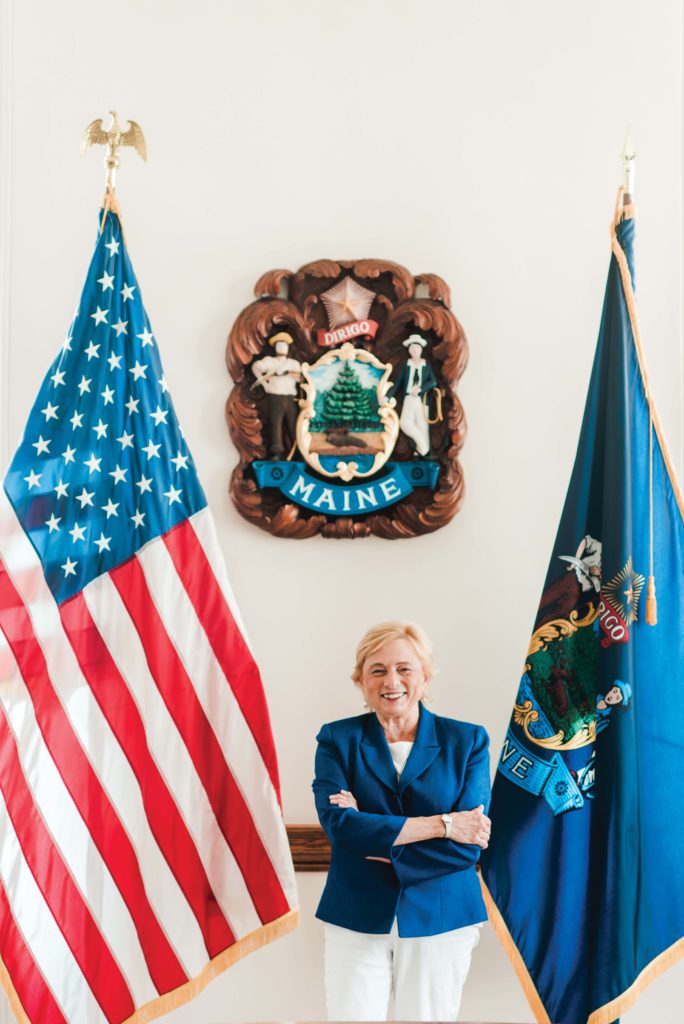Challenge & Opportunity
Governor Janet Mills on her administration’s plans and policies to benefit older Mainers—and the state as a whole.

Challenge & Opportunity
Governor Janet Mills on her administration’s plans and policies to benefit older Mainers—and the state as a whole.
By: Katherine Gaudet
Photography by: Christina Wnek
When Governor Janet Mills took office last January, she assumed leadership of the nation’s oldest state. Over the past decade, the number of Mainers under 18 has dropped and the number of people over 65 has risen rapidly. “When I first entered public service as an assistant attorney general years ago, Maine did not have a demographics challenge, shrinking workforce, or rising need for senior services,” says Mills, who is 71. “Now, about 25 percent of our population is 65 and older, and that percentage is expected to grow by 55 percent by 2026. Rising health care and housing costs are sapping retirement savings, and more Maine seniors are working longer and caring for other family members.”
These demographic and economic trends reflect those of the nation, as the baby boomer generation hits retirement age, and of the Northeast, as the nation’s population shifts to the South and West. Maine often plays the role of canary in the coal mine; Mills points to an August story from the Washington Post titled “‘This will be catastrophic’: Maine families face elder boom, worker shortage in preview of nation’s future.” Yet an aging population doesn’t have to be a harbinger of economic collapse. “You can’t underestimate the power of people over 50,” says Lori Parham, state director of AARP Maine. “This is a group with enormous purchasing power; they pay more in taxes, give more charitably, and give more in volunteer hours than other age groups.” Mills says that while the challenges are real, “our older population is an untapped asset and part of the solution to our workforce challenge, as we harness the experience, wisdom, and skills of older Mainers to mentor and assist young workers.”

Governor Mills launched her term in office with Executive Order 1: “An Order to Require Expeditious Implementation of the MaineCare Expansion” that extends public insurance, which previously covered people over 65, to covering qualifying people over 50. (The expansion had previously been approved by the legislature and by voters, but was resisted by Governor Paul LePage.) This early action indicated Mills’s sense of the importance of health care to the older population. When Mills named Dr. Jeanne Lambrew, who has decades of experience in national health policy and reform, to head the Department of Health and Human Services, she again underscored the priority of health care: “This is the most important department and the most important appointment I can make,” she said. Lambrew has convened an Aging and Long-Term Services and Supports Advisory Group, which is coordinating listening sessions to gather information across the state, and this fall will present recommendations for specific reforms. “Governor Mills cares deeply about older Mainers and one of her first directives to me as commissioner was to ensure that Maine builds a stronger network of services throughout the state to meet their needs,” said Commissioner Lambrew in a statement. “Older Mainers are essential to our communities, and we are committed to helping them live their lives to the fullest and in good health.”

Having spent her career in law and government, Mills is adept in navigating the technicalities and political exigencies of state law and policy, but her perspective on senior care is also informed by personal experience. “When my husband suffered a stroke six years ago and died a year later, I became all too familiar with the ups and downs of the health care and health insurance system in Maine,” she says. “While that experience brought my family and me closer together, I worried about all the other Maine families who have to fight for their loved one’s care and comfort at the most difficult time of their lives.” In a 2016 speech to the Maine Medical Directors Association, she detailed her struggles with insurance companies— having to appeal coverage denials seven different times, seeing a medication expense declined simply because, it seemed, it was too expensive. “Now, I am a lawyer. I’m the attorney general. I am no shrinking violet,” she said in that speech. “But what about other people who are faced with this paperwork, these phone calls, these nuisance denials intended to wear you down at a time when you are least able to cope with a crisis. What about those families?”
As Mills’s experience reflects, the price of medication is a major stress for families, as well as a driver of health care costs. In this area, Maine has begun to take a leading role. “Maine is the first state to implement prescription drug reform with the emphasis on cost savings,” Parham notes. The effort has been bipartisan, and has produced what Mills describes as a “comprehensive prescription drug reform bill package to encourage the wholesale importation of prescription medicine, to create a prescription drug affordability board, to increase drug price transparency and to better regulate middlemen called ‘pharmacy benefit managers.’” A four-bill package was signed into law in June; its provisions will go into effect this fall.
While health care is often at the center of the challenges faced by older people, affordable housing and transportation are equally crucial to making Maine a livable state for all ages. “In my first month in office, I signed a financial order to begin the release of $15 million in affordable housing bonds for Maine seniors as approved by voters in 2015,” says Mills. “More than 9,000 seniors are waiting for affordable housing, while rising property taxes are driving more Maine people out of their homes.” (These funds, too, were previously approved by voters.) The program is intended to create approximately 200 affordable housing units and provide funds for repairs to existing homes; implementation is being carried out by MaineHousing, the state housing authority.

New and renovated housing is one part of a bigger-picture move toward creating livable communities. “Maine has more Age-Friendly Communities than any other state,” Mills points out, referring to the 65 localities that have joined the AARP Network of Age-Friendly States and Communities, signifying their commitment to develop safe, welcoming spaces for people of all ages. “We should maintain our lead by supporting municipalities as they build safe, walkable communities and expand access to affordable housing, transportation, and other critical services for Maine seniors.”
Such communities are good for seniors— but not only for seniors. Thoughtful infrastructure and policy changes can create spaces that are more livable and accessible for people of many ages. Sidewalks designed to be navigable by a person using a walker or wheelchair also help a parent pushing a stroller; affordable housing built for seniors now might be occupied by young families in a few years; effective health care benefits everyone. Being at the front edge of “the graying of America” means that Maine is in a position to model approaches to aging that create a stable foundation for the state’s economy while ensuring a high quality of life for seniors. In its first year, the Mills administration has taken on this challenge and opportunity, and begun to lay the groundwork for building new approaches to aging, and living, in Maine.

